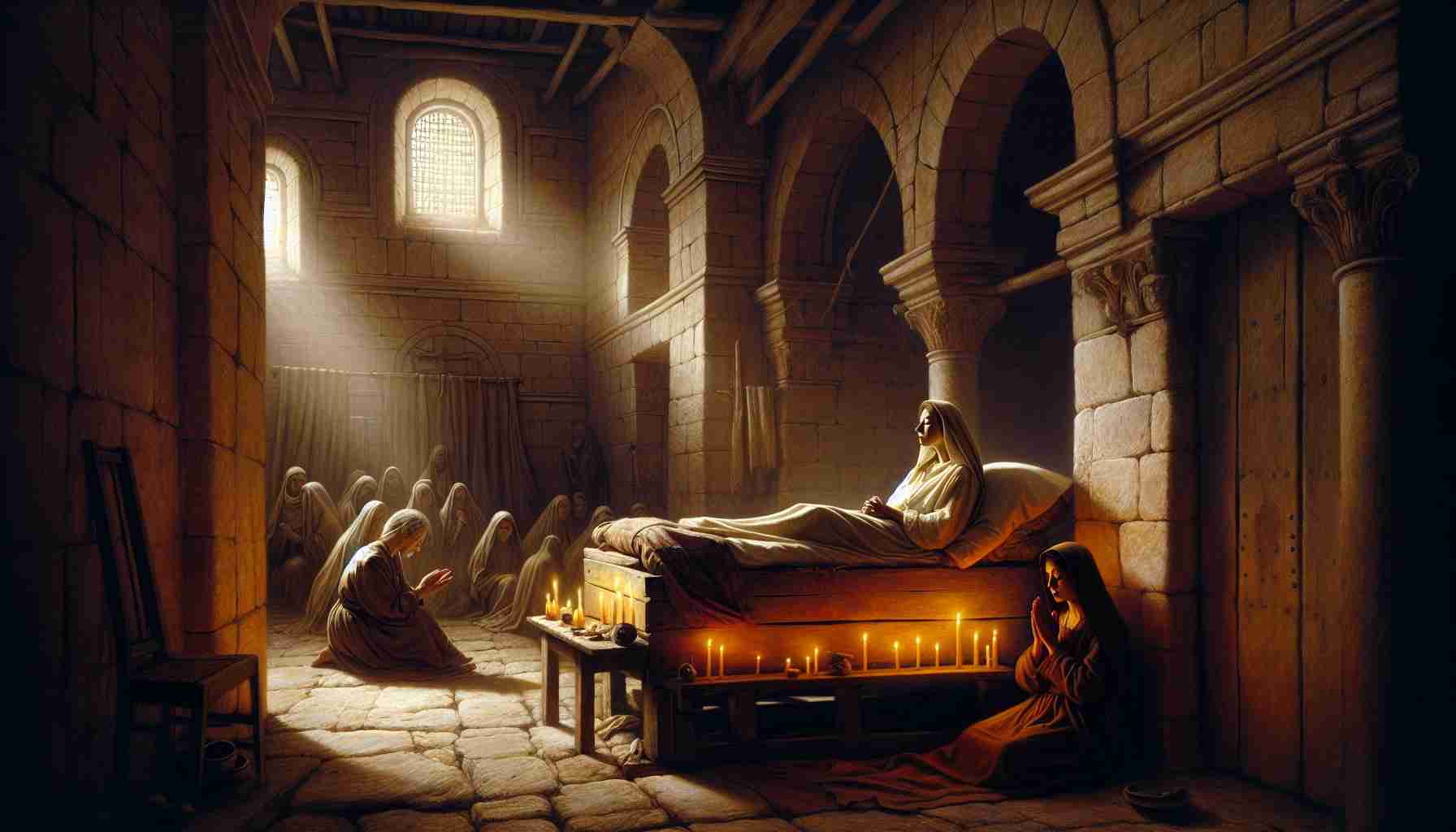

The basilica bell struck the matins hour, a lone resonant toll echoing beneath the sandstone vaults of Rome. Behind the silent walls of the Casa di Santa Brigida—the House of Saint Bridget—candles flickered low near the wooden pallet where the saint’s breath faltered. The year was 1373, and the summer heat mingled with the scent of myrrh and lavender, placed beneath her bedding to ease the final passage. Rome slept fitfully under the weight of sins yet to be confessed, but within this house, heaven held its breath.
Bridget lay motionless, her eyes fixed not on the mortal tenders at her bedside but upon a vision unseen—her mind deep within the glory that had stirred her soul since girlhood. Her daughter, Katarina, knelt beside her, clutching the edge of the bed, lips pressed to whispered prayers. Around her stood servants and scribes, hardened pilgrims who had followed the noble widow from the cold fjords of Sweden to the ancient seat of Christendom.
Outside, St. Peter’s Basilica, half in repair and half crackling with promise, loomed like an unanswered prayer. The city’s cobbled streets held the footsteps of exiles and crusaders alike, but none moved with Bridget’s certainty. Her journey—as woman, widow, mother, and mystic—had made her presence impossible to ignore, even beneath the tiara of popes.
It was nearly forty years ago that she received her first revelation—no ordinary fancy but a blaze of knowing, as if heaven had rent the veil and allowed her a glimpse of divine sorrow. She had stood in Ulf’s hall, skirts brushing rush-covered stone, when the suffering Christ appeared before her, bleeding and crowned, his gaze accusing and tender. “Look at my wounds,” he said, voice calm beneath the burden of pain. “See how little the world loves me.”
Ever since, words spilled from her soul like oil from a pressed olive. She recorded them—commands, prophecies, rebukes—in her Revelationes Celestes. Popes feared her; kings stood still when her warnings arrived. She dared to call Clement VI the “destroyer of souls.” Few women had the courage to tell the Vicar of Christ to turn back toward Christ Himself—and fewer still were heard.
Bridget’s vision of church reform was a fire threatening the rot. In a time when papal courts gleamed with silks and simony, her call was stark: return to the suffering Man of Sorrows. Founding the Bridgettine Order from her vision of a new monastic ideal, she shaped a community of dual houses—one for men and one for women—ruled not by a monk, but an abbess. It was radical as it was reverent, a mirror to Mary at the foot of the Cross.
Her path to Rome had been perilous. Years of pleading with popes to return from Avignon had exhausted her body, yet never her zeal. She walked beside plague-stricken pilgrims, intervened in disputes between bishops, and dictated revelations that constellated judgment and mercy. The road she chose was lonely, and rumors circled her like scavengers—some whispered she was mad, others that she was the mouth of God.
Now, her time ended where so many saints had begun: beneath the shadow of Peter’s bones.
A sudden hush fell in the room. Even the cicadas outside the borgo seemed silenced. Bridget’s lips moved once, twice, inwardly. Katarina leaned forward, and if she could have heard anything beyond her sobbing breath, she might have caught it: not words, but awe.
Then, nothing. The saint was still.
The candles bowed low with exhaustion, their ribs of flame thinning to blue. Outside, a wind rose, uncommon for summer in the city, rustling the cloaked figures who’d already begun to gather outside the house. They came not because she had died, but because she had lived with fire.
Three months later, her bones were ferried across mountains and sea, back to Vadstena, Sweden—a labor of devotion that stitched her name into the very fields she'd once roamed as a child. There, a great abbey rose beside the lake, its stones whispering her prayers into centuries yet unborn.
But in Rome, her house remained—a modest, ochre-stained structure not far from Campo de’ Fiori. To the pilgrim who steps through its doorway today, a hush still clings to the air like incense. The upper room where she died holds her wooden crucifix. According to some, blood once seeped from its carving during one of her visions. Others saw nothing but a woman kneeling—hearing what others could not bear to hear.
As Revelation 1:3 declared: “Blessed is the one who reads aloud the words of this prophecy…and blessed are those who hear it and take to heart what is written in it.” In an age when few dared lift their voices against deceptions cloaked in gold, Bridget listened so others might hear.
In her silence, a thousand pages burned with the brightness of divine rebuke. Popes decayed, kingdoms fell, yet her words endured—not by canon or sword, but by the fragile, unyielding faith of a woman who dared to believe Christ could still speak.
And when she heard Him, she wrote.